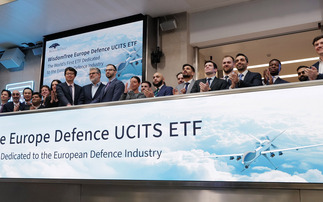Industry Voice: Fixed income ETFs have seen more than €8bn inflows so far in 2018 - one of the fastest growing segments. Lyxor ETF looks at why wealth managers are turning to low cost bond funds.
Equity rather than bond investors tend to make the most use of passive investment products. But over the past few years that's started to change, as the number of fixed income Exchange Traded Funds (ETFs) has grown.
It's understandable why asset flows into fixed income investments lagged their equity counterparts in recent years: as yields are low. As a result, investors are very aware of the impact of fees on their potential returns.
But fixed income ETFs are one of the fastest growing segments of the European ETF market - accounting for almost £1 in every £4 invested in ETFs. Bond ETFs are now looking like serious challengers to traditional actively managed funds.
View Lyxor's range of low cost Core ETFs, with bond funds from 0.07% TER
Low fees for low risk
Within fixed income ETFs, government bonds represent the largest segment. Products which give access to gilts and treasuries are particularly appealing to investors with low risk portfolios. An allocation to this asset class is vital to this style of investment yet actively managed funds struggle to add value despite charging higher fees.
That's why a low cost sovereign bond ETF has been such a useful tool for cautious investors: they can maintain their risk profile while still gaining returns net of fees, even if the yield is low.
View Europe's cheapest gilts - TER of 0.07%
Diversifying your bonds
But ETFs are not just the staples - it's now also possible for investors to use passive products to gain exposure to the credit markets, particularly high yield bonds. This expands the investment universe for smaller investors - it was difficult in the past for them to access this market.
And there are advantages to selecting a high yield ETF rather than an active fund. Investing in a high yield bond index tracker can reduce risk as it is more diversified; ETF portfolios may be much broader than those run by an traditional manager.
Credit rating rules are also often more defined for an index than for an actively managed fund. Some active managers might buy a bond and stick with it even if the credit rating of the issuer falls. But an index must always be within the assigned credit quality.
Rising interest rates have made high yield markets more appealing to investors because the duration of these bonds is lower. That means the price of the instruments is less negatively impacted by increases in the cost borrowing than longer dated bonds.
Lyxor runs both standard and short term high yield bond funds. Short term bonds can be more stable in the event of rising interest rates. Available as US Dollar bonds or Euro denominated bonds
Concerns
But while low cost fixed income ETFs are opening up markets for investors, there have been concerns about using these types of products. For example, some have queried market weighted corporate indices, where more is held of highly indebted companies.
But these concerns may be overblown. The bond market is materially different to the equity market. This is an over-the-counter market so the trading is carried out by two professionals who look at market specifics. Bonds are credit scored, which means the ability of the company to repay their debt has been assessed. This is very different to equity markets, where a large portion of many companies' shares are still held directly by individuals.
Finding low cost bonds
Low cost fixed income ETFs gives wealth managers a greater range of tools they can use to help their clients reach their investment goals. Whether it's a way for their more cautious investors to access the sovereign bond market or providing those with a greater risk tolerance access to the high yield market, these passive products could prove invaluable.
View Lyxor's full range of bond ETFs, from low cost government bonds to riskier high yield issues
THIS COMMUNICATION IS FOR ELIGIBLE COUNTERPARTIES OR PROFESSIONAL CLIENTS ONLY
* Source for ETF flows and charges: Lyxor ETF, Bloomberg correct as at end September 2018
This document is for the exclusive use of investors acting on their own account and categorized either as "Eligible Counterparties" or "Professional Clients" within the meaning of Markets in Financial Instruments Directive 2014/65/EU. These products comply with the UCITS Directive (2009/65/EC). Société Générale and Lyxor International Asset Management (LIAM) recommend that investors read carefully the "investment risks" section of the product's documentation (prospectus and KIID). The prospectus and KIID are available free of charge on www.lyxoretf.com, and upon request to [email protected].
The products mentioned are the object of market-making contracts, the purpose of which is to ensure the liquidity of the products on the London Stock Exchange, assuming normal market conditions and normally functioning computer systems. Units of a specific UCITS ETF managed by an asset manager and purchased on the secondary market cannot usually be sold directly back to the asset manager itself. Investors must buy and sell units on a secondary market with the assistance of an intermediary (e.g. a stockbroker) and may incur fees for doing so. In addition, investors may pay more than the current net asset value when buying units and may receive less than the current net asset value when selling them. Updated composition of the product's investment portfolio is available on www.lyxoretf.com. In addition, the indicative net asset value is published on the Reuters and Bloomberg pages of the product, and might also be mentioned on the websites of the stock exchanges where the product is listed.
Prior to investing in the product, investors should seek independent financial, tax, accounting and legal advice. It is each investor's responsibility to ascertain that it is authorised to subscribe, or invest into this product. This document is of a commercial nature and not of a regulatory nature. This material is of a commercial nature and not a regulatory nature. This document does not constitute an offer, or an invitation to make an offer, from Société Générale, Lyxor Asset Management (together with its affiliates, Lyxor AM) or any of their respective subsidiaries to purchase or sell the product referred to herein.
Lyxor International Asset Management (LIAM), société par actions simplifiée having its registered office at Tours Société Générale, 17 cours Valmy, 92800 Puteaux (France), 418 862 215 RCS Nanterre, is authorized and regulated by the Autorité des Marchés Financiers (AMF) under the UCITS Directive (2009/65/EU) and the AIFM Directive (2011/31/EU). LIAM is represented in the UK by Lyxor Asset Management UK LLP, which is authorized and regulated by the Financial Conduct Authority in the UK under Registration Number 435658. Société Générale is a French credit institution (bank) authorised by the Autorité de contrôle prudentiel et de résolution (the French Prudential Control Authority).
Lyxor International Asset Management ("LIAM") or its employees may have or maintain business relationships with companies covered in its research reports. As a result, investors should be aware that LIAM and its employees may have a conflict of interest that could affect the objectivity of this report. Investors should consider this report as only a single factor in making their investment decision. Please see appendix at the end of this report for the analyst(s) certification(s), important disclosures and disclaimers. Alternatively, visit our global research disclosure website www.lyxoretf.com/compliance.













